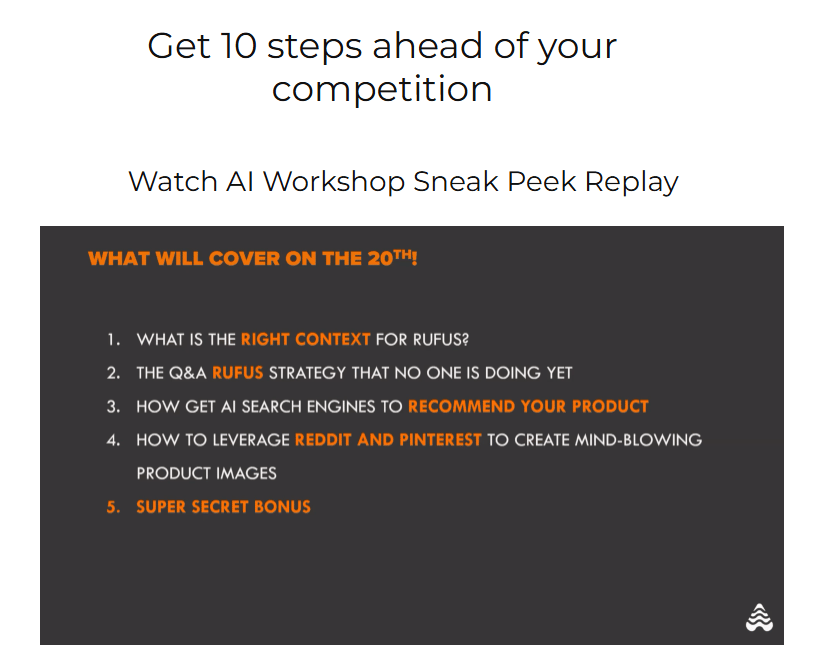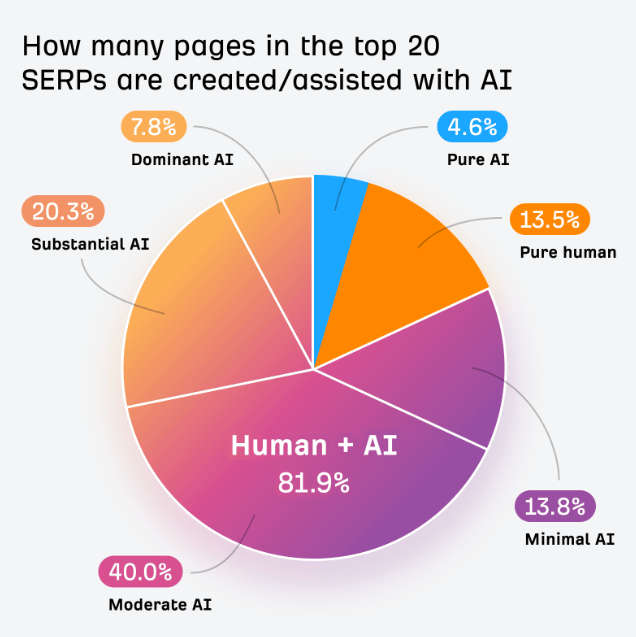- AI for Ecommerce and Amazon Sellers
- Posts
- Does Google Actually Penalize AI Content?
Does Google Actually Penalize AI Content?
This Study of 600,000 Pages Will Shock You


The 2-out-of-3 seller death sentence is here ...
Something big happened last Thursday, and you can still watch it.
8 AI experts gathered on one webinar.
What they revealed will shock you.
Kevin King opened with a bone-chilling prediction: Only 1 in 3 Amazon sellers will survive what's coming.
The AI apocalypse.
And it's already started.
This Ai Apocalypse Webinar replay expires Saturday.
It’s a sneak peek into the AI for Ecom Workshop coming on July 20.
After that, this intelligence disappears forever.
The 2-hour recording reveals exactly what the 1-in-3 survivors will be doing differently.
TLDR: Does Google Actually Penalize AI Content?
A massive study of 600,000 top-ranking pages found that 86.5% of them contain AI-generated content, with zero correlation between AI usage and search rankings. The whole "Google penalizes AI content" narrative? Complete myth.
The real kicker? While everyone's been obsessing over whether ChatGPT will kill their SEO, Google quietly shifted the entire game to brand authority. You could write the most perfectly optimized, 100% human content and still get crushed by a competitor who's built genuine industry recognition. Time to stop worrying about AI detection and start building a brand people actually know about.
Does Google Actually Penalize AI Content? This Study of 600,000 Pages Will Shock You
Okay, let's talk about the debate that's been dominating every SEO discussion for the past two years: whether Google actually penalizes AI-generated content or if that's just marketing folklore.
I've been watching this argument unfold in every ecommerce forum and Facebook group I'm in (and yes, I'm in way too many of them). Half the crowd insists that using ChatGPT for content is SEO suicide, while the other half is quietly using AI tools and crushing it with their rankings. So what's the real story here?
Well, someone finally did the research we've all been waiting for. Ahrefs analyzed 600,000 web pages to figure out Google's actual stance on AI content. And honestly? The results might surprise you.
The Numbers Don't Lie (And They're Kind of Wild)
Here's the thing that made me do a double-take: only 13.5% of pages ranking in the top 20 positions were completely human-written. That means 86.5% of top-performing content had some level of AI assistance.
Let me say that again because it's genuinely mind-blowing: nearly 9 out of 10 top-ranking pages use AI in some form. If Google was really out to get AI content, this would be impossible.
The breakdown is actually pretty fascinating:

Source: Ahrefs
Pure AI content: 4.6% of top results
Minimal AI use (1-10%): 13.8%
Moderate AI integration (11-40%): 40%
Substantial AI assistance (41-70%): 20.3%
What this tells me is that most people aren't using AI as a complete replacement for human writing—they're using it as a collaboration tool. Which, honestly, makes perfect sense if you've ever tried to get ChatGPT to write something that doesn't sound like a robot having an existential crisis.
Google Literally Doesn't Care (Statistically Speaking)
The correlation between AI content percentage and search ranking position? 0.011. For those of you who didn't take statistics (lucky you), that's basically zero. Google's algorithms neither reward nor punish content based on whether a human or AI wrote it.
But here's where it gets interesting: pages ranking #1 tend to have slightly less AI content than lower-ranking results. It's not a huge difference, but it's there. My theory? Pure AI still has some rough edges when it comes to creating truly exceptional content. It's great for getting started, but human oversight and editing still matter for those top spots.
The Real Game Has Changed (And It's Not What You Think)
While we've all been obsessing over whether our AI-assisted blog posts will get penalized, the entire SEO landscape has shifted underneath us. Google isn't just looking at individual pages anymore—they're evaluating entire brands.
This is both terrifying and liberating. Terrifying because it means we can't just optimize our way to the top with clever keyword placement. Liberating because it means we can focus on building something actually valuable instead of playing the constant algorithm guessing game.
Brand authority is now the name of the game. And I'm not talking about the old-school "get backlinks from high-authority sites" approach (though that still helps). I'm talking about becoming genuinely recognized in your industry.
What This Actually Means for Our Businesses
As someone who's spent years trying to figure out how to make money selling stuff online, here's how I'm thinking about these changes:
First, stop panicking about AI content. The data is clear—Google doesn't care if you use AI, they care if your content is useful. I've been using AI to help with product descriptions, blog posts, and even email campaigns. The key is using it as a starting point, not the finish line.
Second, start thinking beyond your website. Your individual product pages are just one piece of the puzzle now. You need to be visible across the entire digital ecosystem. This means:
Getting quoted in industry publications
Appearing on podcasts (even small ones count)
Speaking at conferences or webinars
Building relationships with other sellers and industry experts
Creating content that gets shared and discussed
Third, invest in mention-building, not just link-building. It's not enough to have websites link to you—you need people talking about your brand. One service I’ve found so far is PressxLive.com.
They seem to pitch your content to variety of premium publishers and you pay on a CPC basis which to me is a no-brainer.
The Hybrid Approach Is Winning
The slight preference for human-assisted content at the top positions tells me something important: the future isn't human vs. AI, it's human with AI.
I use AI to help brainstorm ideas, create first drafts, and even generate product descriptions. But I always edit, refine, and add my own perspective. The businesses that figure out how to effectively combine AI efficiency with human creativity and judgment are going to have a massive advantage.
Here's my current workflow (in case you're curious):
Use AI to generate initial ideas and rough drafts
Add personal insights and industry knowledge
Edit for tone and accuracy
Optimize for actual human readers, not just search engines
The Bottom Line for Sellers
The 600,000-page analysis basically confirms what Google has been saying all along: they care about quality and usefulness, not how you created the content.
This also reveals something more important: the game has evolved beyond traditional SEO. Success now requires building a comprehensive brand presence that demonstrates expertise and authority across multiple channels.
The companies that master this dual approach—using AI efficiently while building genuine brand authority—will be the ones that thrive in this new landscape. The rest of us will be stuck playing yesterday's game while the competition moves on.
Do You Love The AI For Ecommerce Sellers Newsletter?
You can help us!
Spread the word to your colleagues or friends who you think would benefit from our weekly insights 🙂 Simply forward this issue.
In addition, we are open to sponsorships. We have more than 35,000 subscribers with 75% of our readers based in the US. To get our rate card and more info, email us at [email protected]
The Quick Read:
A $300M startup once needed 30 marketers, now AI-powered teams run the same game with just 5.
Claude 4 Sonnet just replaced 80% of a full-stack marketing workflow in 90 seconds.
How The Smartest Founders Are Already Winning with AI
Despite the LLM hype, their biggest flaw is still learning. Without memory or context accumulation, they’re stuck as smart interns, not real teammates.
AI agents aren't magic, but they are powerful multipliers.
Jack Dorsey’s new messaging app skips servers entirely. Encrypted, peer-to-peer Bluetooth chats mean no data, no accounts and no censorship, even offline.
Gen Z didn’t break the marketing funnel, they rewired it. S
H&M just launched AI-generated model “twins” to reduce photoshoot needs.
AI won’t rot your brain if you use it right. Treated as a tutor, editor or brainstorm buddy, it can level you up. Outsource your thinking, though, and you risk creative decay.
AWS is launching an AI agent marketplace with Anthropic onboard, giving devs a one-stop shop to monetize agents and compete in the next phase of cloud-native intelligence.
Curious how ChatGPT actually works? It’s not search, it’s pre-trained prediction on massive datasets using transformer tech. This deep dive unpacks the generative magic that made it the smartest tool in your digital stack.
Your prospects are already asking ChatGPT about your brand — is it giving the right answer? A 7-step fix shows how to optimize LLMs as your new first-touch sales rep, using nothing but prompts and smart content cleanup.
The Tools List:
📝 Fanfuel - A tool to create YouTube content, thumbnails, scripts and analyze audience.
🤖 Top GPTs - Access the best OpenAI GPTs without a Plus subscription
⚙️ Descript: Your all-in-one content companion to write, record, transcribe, edit, collaborate, and share your videos and podcasts.
💬 FlowGPT - This website provides a platform for sharing and discussing prompts for GPT models.
🔗 Matrices - AI native spreadsheet that fills itself.
About The Writer:

Jo Lambadjieva is an entrepreneur and AI expert in the e-commerce industry. She is the founder and CEO of Amazing Wave, an agency specializing in AI-driven solutions for e-commerce businesses. With over 13 years of experience in digital marketing, agency work, and e-commerce, Joanna has established herself as a thought leader in integrating AI technologies for business growth.
For Team and Agency AI training book an intro call here.